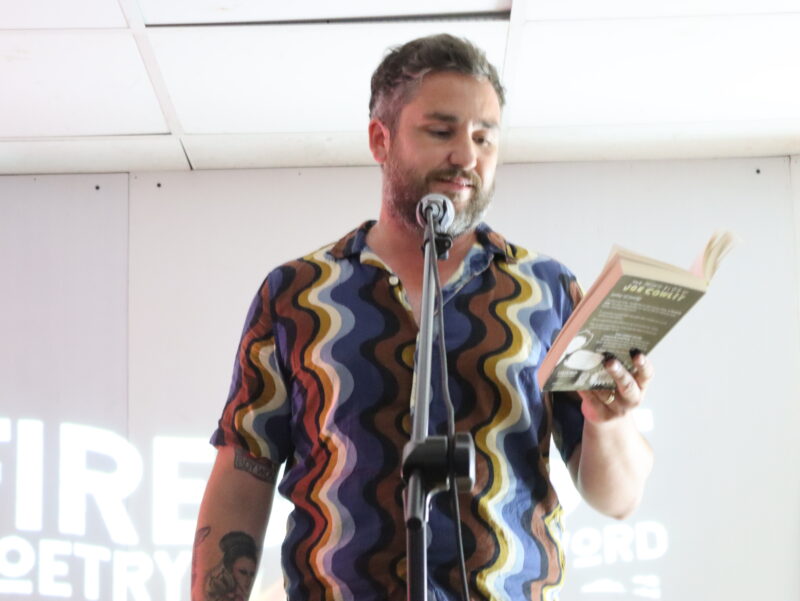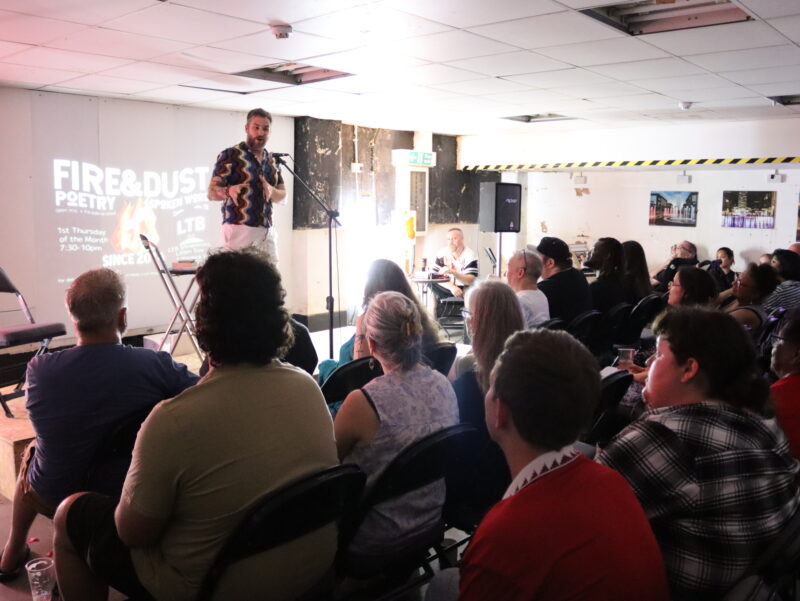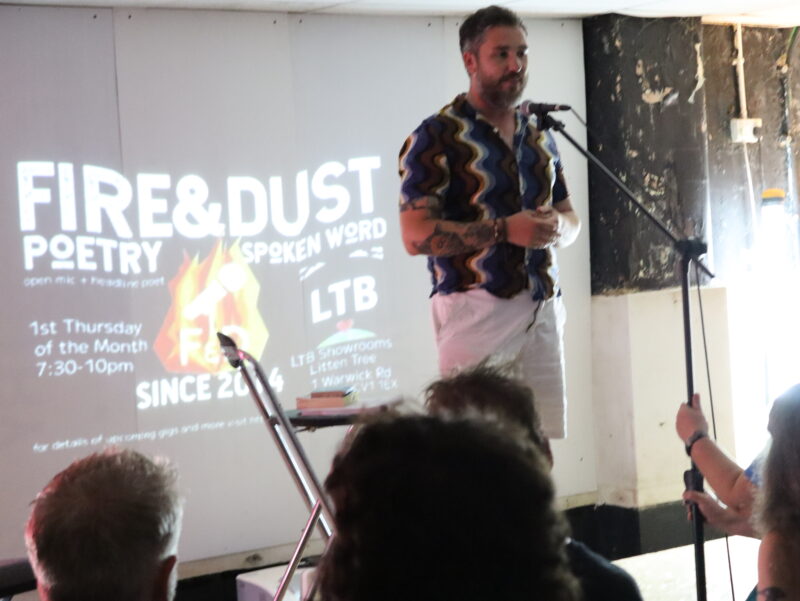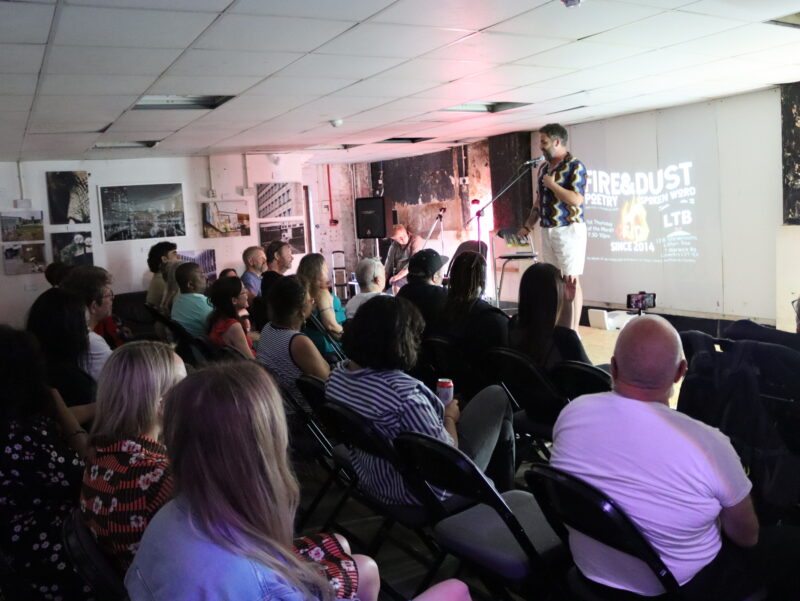INTERVIEW: FIRE & DUST MEETS BEN DAVIS
Ben Davis is a multi-slam winning Midlands poet, an award-winning author of children’s books, and a journalist. He was also a stand-up comedian for a decade, and his poems are packed with wit, playfulness and punchlines. Ben has headlined poetry nights all over the country and appeared at the Edinburgh and Cheltenham Literature Festivals. His 2020 novel, The Soup Movement, was nominated for the prestigious Carnegie Medal. He currently lives in Staffordshire with his wife, son and “wimpy dog”, and works as a postal delivery worker.
Ben was our headline poet at the LTB on 1st August 2024. We caught up with him after the gig, to ask a few questions…
HCE: Tell us a little about yourself. Your background, your work, and the themes you like to explore. What inspired you to start creating and performing poetry?
BD: I used to love writing poetry as a kid, but fell out of practice for years. I tried a few times, but my attempts came out very clunky and worthy so I kept them to myself! Then, after I became a kids’ author, I tried writing kids’ poetry, but found that it often became a bit too adult for that audience! And that was how I found my style.
I used to be a stand-up comic years ago, so the performance side of things wasn’t new to me. I was inspired by poets like Luke Wright, Kae Tempest, John Cooper Clarke and John Hegley.

HCE: Your Fire&Dust set featured plenty of humour/comedy. How important a writing device do you think humour is, and what purpose do you believe it serves in poetry and performance?
BD: I think it’s just how my brain works. I’m always looking for the funny in everything. It makes me quite annoying to live with, but there’s not much I can do about it! For me personally, humour is essential. My favourite poets, authors, filmmakers, musicians all incorporate it to some degree. Even if the subject matter is very serious, it’s got to have some levity in there, otherwise I’m going to start to get twitchy.
HCE: What do you think are the essential ingredients that make a good story?
BD: That’s a good question! I think you’ve got to have a compelling main character, not necessarily likeable but they should have something about them which draws you in. For me, good dialogue is a must, too. If the characters don’t speak to each other like actual humans, it’s a turn-off. Other than that, I’m not sure I know. I think there’s a certain magic when a story really resonates with you as a reader and it’s a difficult thing to dissect.
HCE: Who is your work aimed at – do you have an ideal audience in mind when you’re putting a poem together?
BD: I think first and foremost I’m writing for me. Does it make me laugh, make me feel something? Whenever I’m asked for writing advice, I always say write the kind of thing you would want to read, so that’s what I do.
After that, I wouldn’t say I have an ideal audience in mind, but what I’ve had some success with in the past is getting people on board who don’t normally enjoy poetry. I think sometimes people forget that poetry can be funny and it’s not just the stuff they were forced to learn at school!

HCE: Do you believe it’s important to encourage young people to both read and write for pleasure?
BD: Absolutely. As a kids’ author I’m often doing events in schools for that very purpose. I think reading is a key method of building empathy and imagination. Plus, it’s supposed to be fun, and that’s something I try to get across. As for writing, one of the most rewarding parts of my job is doing workshops in schools and getting kids who don’t normally participate in things like that involved and seeing the excitement on their faces when they’ve created something of their own. To quote the great Kurt Vonnegut, ‘it makes your soul grow’.
HCE: Who were some of your favourite writers when you were a kid? Did you read much poetry back then?
BD: I did read a fair bit of poetry and it’s strange that I can remember certain poems, but rarely the poet! Of course Roger McGough was a favourite. I also have a strong memory of seeing a poet called David Harmer perform a poem that went ‘Mr Moore, Mr Moore, creaking down the corridor.’ And the first book I ever remember reading was Hairy Maclary from Donaldson’s Dairy by Lynley Dodd. The rhymes from that are still stuck in my head years later.
HCE: You’ve won multiple poetry slams. Is there an overlap between what a performer needs to do to compete for audience applause and points at a slam, and ‘competing’ for audience laughter at a stand-up gig?
BD: Slams are a strange beast, and I think they favour certain types of poets more than others. They shouldn’t be seen as a huge indicator of someone’s talent as a writer and should just be treated as a bit of fun. They certainly remind me of comedy competitions from back in the day, sitting there mentally calculating your chances and who you think might have you beaten! Here’s a fact for you: the last comedy competition I did was won by Josh Widdecombe. Shame he faded into obscurity after that.

HCE: What would you say are the essential skills to facilitate a successful creative writing workshop in schools? Do you put more of an emphasis on enjoyment or on encouraging participants to challenge themselves?
BD: I think it’s important to make it a level playing field, as far as that’s possible. Often, we’ll create a couple of characters and a basic storyline as a group, which gives them the scaffolding to get going, rather than just presenting them with a blank page and telling them to write.
I try and make it enjoyable and entertaining first and foremost, which I find often encourages them to push themselves and try something new without worrying about getting it wrong.
HCE: Are there any differences in how you approach writing poetry aimed at children and writing poetry aimed at adults?
BD: Not massively. I think I’m often looking for the laugh and writing about relatable topics, it’s just the subject matter that has to change. Then you’ve got poems like My Grandad’s a Nudist, which can work for both.
HCE: How did it feel to be nominated for such a prestigious award as the Carnegie Medal?
BD: Great! It was for a book of mine called The Soup Movement, which seemed to strike a chord with some people. Sadly, my award-winning/nomination era coincided with lockdown, so all my ceremonies were on Zoom, and I was usually wearing a nice shirt with pyjama bottoms.
HCE: When you’re working on a book, at what stage do the illustrations come into it, and what is that experience like for you as the author? Are you able to submit ideas for what goes on the page, or is it more the artist and publisher who have control over this?
BD: Illustrations will come in when the book is pretty much finished. Usually, the designer will liaise with the illustrator over what’s going to go in there. My involvement is quite minimal, but they will send roughs for my approval.
I’ve been lucky enough to work with some fantastic illustrators, like Mike Lowery, Julia Christians and James Lancett, and it’s a thrill to see how they interpret the characters. With the Lenny Lemmon series I do with James, it’s especially fun to write some really wacky stuff, knowing James is going to draw it!
HCE: In your experience, is Tamworth a good place to be a poet/writer and does Staffordshire have a thriving literary scene?
BD: Hmm. I’d be lying if I said there was a huge scene where I live, but I know a few writers and artists that are doing some really cool things. New Urban Era are a great local arts collective that put on visual art, dance, spoken word, music and all kinds of stuff in Tamworth. In fact, I’m doing a couple of gigs for them in September. More of that kind of thing!

HCE: What type of poetry do you seek out for personal enjoyment? As a reader/listener, when you engage with a poet’s work, what are you hoping to get out of it?
BD: I don’t especially have a type, I don’t think. Shoutout to Philip Larkin for igniting my love of poetry as a teenager, nasty old bloke that he was. These days, aside from Luke Wright, Dr JCC and Kae Tempest, I love Liz Berry. I especially love hearing her read. There’s something about that soft Black Country lilt that makes her words even more poignant! She performed a poem called Peaches at a recent online gig I attended, which made me well up. Also, I must big up my old mucker George Bastow, who is making waves on the spoken word scene. I’ve known him since he was a lad and we have worked together running creative writing workshops for kids over the last few years. He’s a dynamite writer and it’s been a privilege to watch him blossom.
HCE: What’s next on the horizon for you? Are you already working on a new project/booked for upcoming performances?
BD: Well, I’m working on a couple of things I’ve got to keep secret, on pain of death. I can tell you that the fourth book in the Lenny Lemmon series, Lenny Lemmon and the Doomed Safari is coming out in February next year. Thankfully, I’m going to be plenty busy for the foreseeable future!
HCE: What’s the best way for people to keep connected with you and your work, or contact you for bookings?
The Soup Movement and Ben’s other books are available online from good bookshops and retailers. You can view the whole selection on his website.
